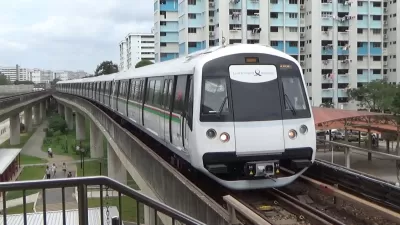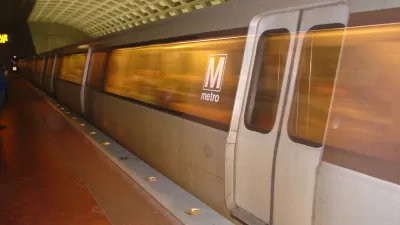Capital investments could get more expensive, if Congress forces transit systems to buy American.
"Yesterday, the White House issued an official endorsement of a version of language banning mass transit rolling stock procurements from Chinese manufacturers that includes buses as well as railcars, in a blow to electric bus manufacturer BYD," according to an article by Jeff Davis.
The endorsement is found in a letter [pdf] from the acting director of the Office of Management and Budget that explains the Trump administration's position on matters still to be negotiated as Congress hammers out a new National Defense Authorization Act for fiscal year 2020.
"The House has passed H.R. 2500 [pdf] and the Senate has passed S. 1790 [pdf], and both bills contain very similar provisions prohibiting the use of federal mass transit funds for the purchase of transit rolling stock from manufacturers owned, or subsidized by, the Chinese government, and discouraging transit agencies from using non-federal funding for such purchases," according to Davis.
Davis explains in more detail the legal language that would change procurement for transit agencies in the United States:
The language is mainly targeted at Chinese state-owned rail manufacturer CRRC, which has won several major rail car procurements (Boston, Chicago, Los Angeles) with ultra-low bids in the last few years. But there is one key difference between the provisions – the House provision (section 896 of H.R. 2500) applies only to “rail rolling stock procurements” while the Senate language (section 6015 of S. 1790) applies to all rolling stock procurements, which means that the Senate language also applies to procurement of buses while the House language does not. BYD, while not owned by the Chinese government, does receive some subsidies from them, which would make them subject to the ban.
There's more on the political ramifications of the potential ban on Chinese-manufactured buses in the article. Davis also wrote a report in September 2018 about the consequences of such a ban on transit operations and the economy.
FULL STORY: White House Endorses Ban on Chinese Bus and Rail Procurements

Planetizen Federal Action Tracker
A weekly monitor of how Trump’s orders and actions are impacting planners and planning in America.

Maui's Vacation Rental Debate Turns Ugly
Verbal attacks, misinformation campaigns and fistfights plague a high-stakes debate to convert thousands of vacation rentals into long-term housing.

San Francisco Suspends Traffic Calming Amidst Record Deaths
Citing “a challenging fiscal landscape,” the city will cease the program on the heels of 42 traffic deaths, including 24 pedestrians.

Defunct Pittsburgh Power Plant to Become Residential Tower
A decommissioned steam heat plant will be redeveloped into almost 100 affordable housing units.

Trump Prompts Restructuring of Transportation Research Board in “Unprecedented Overreach”
The TRB has eliminated more than half of its committees including those focused on climate, equity, and cities.

Amtrak Rolls Out New Orleans to Alabama “Mardi Gras” Train
The new service will operate morning and evening departures between Mobile and New Orleans.
Urban Design for Planners 1: Software Tools
This six-course series explores essential urban design concepts using open source software and equips planners with the tools they need to participate fully in the urban design process.
Planning for Universal Design
Learn the tools for implementing Universal Design in planning regulations.
Heyer Gruel & Associates PA
JM Goldson LLC
Custer County Colorado
City of Camden Redevelopment Agency
City of Astoria
Transportation Research & Education Center (TREC) at Portland State University
Jefferson Parish Government
Camden Redevelopment Agency
City of Claremont





























